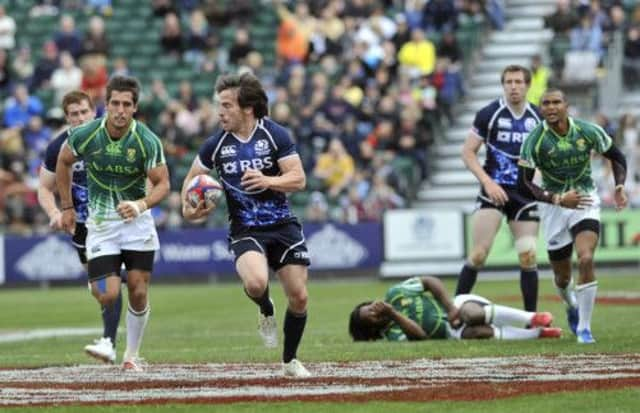Glasgow 2014: Scots going for glory with sevens


Just as the Commonwealth Games are now becoming a new beacon of hope for rugby in its pursuit to become a global sport, so the ability to win gold, silver and bronze medals in the Games, and from 2016 the Olympics, has offered a new focus for leading players – in Scotland and across the world.
One only has to look at the example of Carlin Isles, the American sprinter whose 100m times were not quite good enough to win a place in the US Olympic team, but would have earned him a place at least in the London semi-finals. He has been chased by American football teams, but after missing out on the Olympic sprint dream has opted for rugby sevens as his route to the top.
Advertisement
Hide AdAdvertisement
Hide AdHaving shown his sevens ability for Scotland in various world tournaments over the years, at the same time as playing for Glasgow Warriors and pushing for that elusive Scotland call-up, Gregor made the decision two years ago to throw his lot in with the sevens game and he does not hide the fact that his home city staging the Commonwealth Games was part of the allure.
“It is huge,” he said, “and although we are still over a year away, the announcement of the ticket prices recently and the hype around the venues has got the excitement building.
“I love sevens and I think when a big crowd of Commonwealth Games fans come into Ibrox to see it next year, thousands will be turned on to it. In many ways it’s a far more attractive game to people who don’t know rugby than what we see every week in the 15s. It’s less technical, much quicker, no scrums and boring resets, or kicking to touch, wandering up and taking lineouts, and mauls.
“The rugby connoisseurs will say different, but the way sevens have grown around the world everyone is really buying into the fact that this is a sport where people can roll up knowing nothing about the game, but immediately become drawn in by the carnival atmosphere, the speed of the game, the big hits and the plethora of tries in every game.
“It’s also more relaxed and sociable, because there are games on and off regularly, and I think it’s well suited to the atmosphere of the Games. I first experienced that in Melbourne in 2006 and it was awesome.
“But every year we’re seeing another couple of thousand at the Dubai tournament, which is just huge. There were 27,000 watching one day of the Vegas sevens this year, and that’s a place where rugby hasn’t been big in the past and there are certainly plenty other things to do.
“The world series has really opened people’s eyes to sevens and with the push on now for us to have a great Commonwealth Games, building on the success of the London Olympics, and then leading into the first Olympic sevens in Rio, why wouldn’t you want to be part of this?”
Good question and another that will be taxing the minds of Scottish coaches is who exactly will be part of the Scotland effort to surpass previous achievements and win a medal on home territory.
Advertisement
Hide AdAdvertisement
Hide AdArguably, the most all-round skilful sevens player to have represented Scotland over the past decade, Gregor has regularly won plaudits from across the globe, but that is just as well because the country that invented the abbreviated game 130 years ago has otherwise fallen off the map.
The SRU moved last year to put Scotland on an equal footing with the top ten sevens teams by investing new funds into making Scotland a full-time squad. They employed an English coach, Phil Greening, but the team hit rock bottom and he soon departed, leaving former coach Stevie Gemmell to pick up the pieces.
There was a great sigh of relief two weeks ago when Scotland came through a new qualifying tournament simply to retain their place on the world circuit for next season, after falling out of the top 12 in the world rankings. But sevens remains a conundrum in a country with so few rugby players, and coaches demanding the best exclusively for their club or professional team when not playing representative rugby.
Gregor believes, however, that there will be a move to bring more leading names into the sevens fold in 2014.
“That has to happen, I think,” said Gregor, “because the Commonwealth Games is massive for us as a country and for rugby.
“I think there will be talks between Stevie, Scott Johnson [SRU director of rugby] and the pro team coaches about what players might be available from Edinburgh and Glasgow at the end of the season, to boost our strength in depth. Not all players can play sevens, but we saw the difference that Lee Jones made coming in for Glasgow and London so some can.
“It means that all of us involved will be under more pressure, but that is not a bad thing. We have a very good, hard-working squad at the moment, that is better than we showed at times this year, but we’re preparing for the World Cup in Moscow next month with the intent of starting the Commonwealth Games build-up now and everything is focused on winning a first rugby medal for Scotland.”